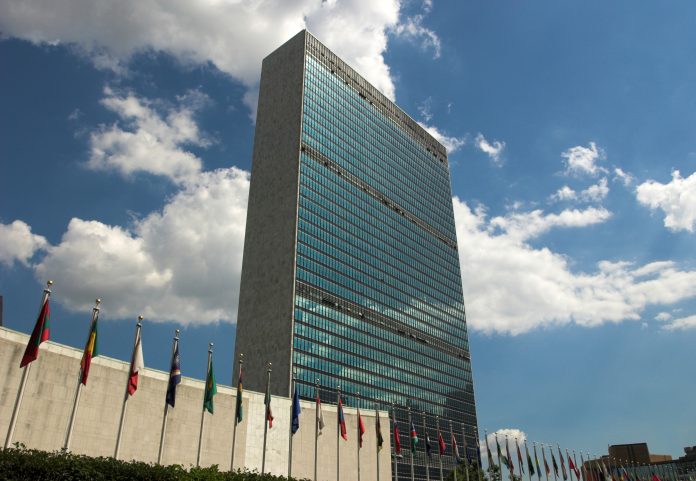The United Nations secretary-general omitted countries responsible for grave violations against children in conflict in his new “list of shame”
The list also gave certain countries an undeserved more favourable designation despite their failed promises to improve their record.
Secretary-General Antonio Guterres released his annual report on children and armed conflict on July 30, 2019, in advance of a UN Security Council open debate on the subject on August 2. The Security Council has requested an annual list of those responsible for grave violations against children in armed conflict since 2001.
“The UN secretary-general simply refuses to hold to account all warring parties that have inflicted tremendous suffering on children,” said Jo Becker, children’s rights advocacy director at Human Rights Watch.
“By listing selected violators but not others, Secretary-General Guterres is ignoring the UN’s own evidence and undermining efforts to protect children in conflict.”
Guterres failed to list the Israel Defense Forces, the Afghan National Army, and US-led international forces in Afghanistan in the new report as responsible for grave violations against children, including killing and maiming, despite considerable evidence of violations by these parties.
Although he listed the Saudi Arabia-led coalition in Yemen, he once again included the coalition in a category of parties taking steps to improve, despite overwhelming evidence that coalition forces killed and harmed children on a large scale in 2018.
According to the report, the number of Palestinian children killed or injured reached its highest level since 2014. 59 Palestinian children were killed in 2018, 56 of them by the Israel Defense Forces, nearly a four-fold increase over 2017. In the West Bank, Israeli forces injured 1,398 children in 2018, while in Gaza they injured 1,335 children. A Palestinian rocket injured 6 Israeli children in 2018. Previous reports have also found the Israel Defense Forces responsible for killing and maiming Palestinian children, but the secretary-general has yet to include the Israeli forces in his list of abusers.
In Afghanistan, child deaths reached the highest level since figures were first recorded in 2009. The secretary-general found that the US-led international forces were responsible for 286 child deaths and injuries in 2018, nearly triple the number reported in 2017 but did not include the forces in his list. He also did not include the Afghan National Army, responsible for 467 child deaths and injuries.
The Security Council requires parties on the secretary-general’s list to sign and carry out an action plan with the UN to end their violations against children. Twenty-eight parties to armed conflict have signed such plans. Once parties carry out their plans and end violations, they may be removed from the list. Parties that refuse to sign or carry out an action plan may be subject to sanctions, including arms embargoes, travel bans, and asset freezes.
For the third consecutive year, the secretary-general has divided his “list of shame” into two separate lists, one for parties that have not put in place measures to protect children, and another, “List B,” for parties that have put in place measures “aimed at improving the protection of children.”
The 2018 “List B” includes both the Saudi-led coalition and the Somali National Army, despite spikes in violations by both parties in 2018. According to the secretary-general’s report, the Saudi-led coalition was responsible for 729 child casualties – killed and injured – in Yemen in 2018, compared with 670 in 2017. In 2018, the Somali National Army was responsible for 113 child casualties, compared with 88 in 2017, and 155 cases of child recruitment, compared with 119 in 2017. Despite these increases, they retained their “List B” status.
“It’s baffling that the secretary-general’s ‘not-so-bad’ list gives credit to parties that are increasing, not reducing, their violations against children,” Becker said. “Guterres should return to a single list based solely on evidence of violations on the ground.”
Guterres appropriately included the armed forces of Syria, Myanmar, and South Sudan on the list of shame.
In at least two cases, Guterres included parties to conflicts on his list for some violations, but not others. For example, last year he de-listed the Saudi-led coalition for attacks on schools and hospitals in Yemen, despite 19 UN-verified attacks on schools during 2017. In his new report, he attributes 12 attacks on schools and 3 attacks on hospitals to the coalition, yet again does not include coalition forces in his list for attacks on schools and hospitals. They are listed only for killing and maiming children.
Similarly, the secretary-general reported that the Somali National Army was responsible for 50 cases of sexual violence in 2018, yet only listed the forces for killing and maiming and recruiting child soldiers.
The report completely fails to mention reported abuses by the government or militants in Cameroon’s Anglophone regions or Ukraine. In his November 2018 report on Central Africa, the secretary-general highlighted civilian casualties, including children, in English-speaking regions of Cameroon, and in June 2018, UNICEF, the UN children’s agency, reported that 58 schools had been damaged since the beginning of the crisis in the country’s North-West and South-West regions. Human Rights Watch has documented the kidnapping of hundreds of students by armed separatists, as well as their occupation of school buildings.
In Ukraine, the Organization for Security and Co-operation in Europe reported that at least 28 children died in hostilities in 2018 and the Education Cluster reported at least 82 security incidents involving educational facilities in 2018, including the shelling of schools.
“The ‘list of shame’ is a powerful tool for accountability and ending violations against children,” Becker said.
“During the upcoming Security Council debate, member states should demand a list based on facts. Pampering major violators to avoid unpleasant backlash risks making a mockery of the whole exercise.”





![Europe’s housing crisis: A fundamental social right under pressure Run-down appartment building in southeast Europe set before a moody evening sky. High dynamic range photo. Please see my related collections... [url=search/lightbox/7431206][img]http://i161.photobucket.com/albums/t218/dave9296/Lightbox_Vetta.jpg[/img][/url]](https://www.openaccessgovernment.org/wp-content/uploads/2025/04/iStock-108309610-218x150.jpg)





